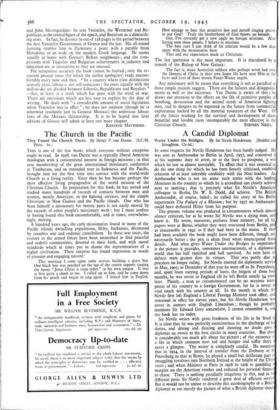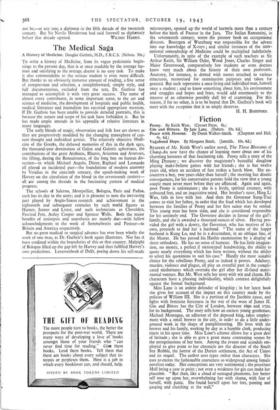A Candid Diplomat
IN some respects Sir Nevile Henderson has been hardly judged. He was sent as Ambassador to Berlin in April, 1937, and conceived it as his supreme duty to avert, or at the least to postpone, a war which he saw as almost inevitable. To effect that it was essential to do the one thing for which he has been fiercely criticised, establish relations of at least tolerable cordiality with the Nazi leaders. An Ambassador who is not on some such terms with the leading Ministers in the country to which he is accredited can clearly achieve next to nothing ; that is precisely what Sir Nevile's American colleague in Berlin, Dr. W. E. Dodd, did achieve. The British Ambassador, of course, failed ; he called his story of his Berli experiences The Failure of a Mission ; but by 1937 no Ambassador could have deflected Hitler from his purpose.
The present volume was produced in circumstances which ahnos silence criticism, for as he wrote Sir Nevile was a dying man, and knew it. He wrote, moreover, perforce from memory, for all his papers were at Berne, whither they were evacuated from Berlin, an as inaccessible in 1942 as if they had been in the moon. If th had been available the book might have been different, though not necessarily better ; the pen is often freer when emancipated from details. And what gives Water Under the Bridges its importance is the picture it provides, sometimes unconsciously, of a diplomatic world that has half vanished and half survived. As seen here its defects were greater than its virtues. That was partly due to practices no longer ruling. Sir Nevile entered the diplomatic servic in May, 1905; in December of that year he went off to St. Petersburg, and, apart from varying periods of leave, the longest of them fo months, he was never in England till he left Berlin nearly 34 y later. Plainly, a man so circumstanced can be no accurate inter preter of his country to a foreign Government, for he is never in vital touch with his country at all. In the month in which Sir Nevile first left England a Liberal Foreign Minister took office, an remained in office for eleven years, but Sir Nevile Henderson was never in contact with English Liberalism ; though he probably mentions Sir Edward Grey somewhere, I cannot remember it, a the book has no index.
Sir Nevile writes with great frankness of his life as he lived It is clear that he was perfectly conscientious in the discharge of his duties, and dining and dancing and shooting no doubt gave a diplomat an entrée to the best circles in many countries. But the is considerably too much gilt about the picture ; of the existence a life in which common men toil and hunger and suffer there never a glimpse. The writer is completely candid. He mentio that in 1914, in the interval of transfer from the Embassy at S Petersburg to that at Rome, he played a small but deliberate part in smuggling revolvers into Northern Ireland at the height of the Ulst crisis ; and when Minister at Paris in 1928 he took to gambling
margins on the American market and reduced his personal fmanc to chaos. There is nothing peculiarly iniquitous in this, and in h different posts Sir Nevile rendered a great deal of efficient servic But it would not be unjust to describe this autobiography of a Britis diplomat as too merely the picture of what a British diplomat shout not be,—at any rate, a diplomat in the fifth decade of the twentieth century. But Sir Nevile Henderson had said farewell to diplomacy



























 Previous page
Previous page